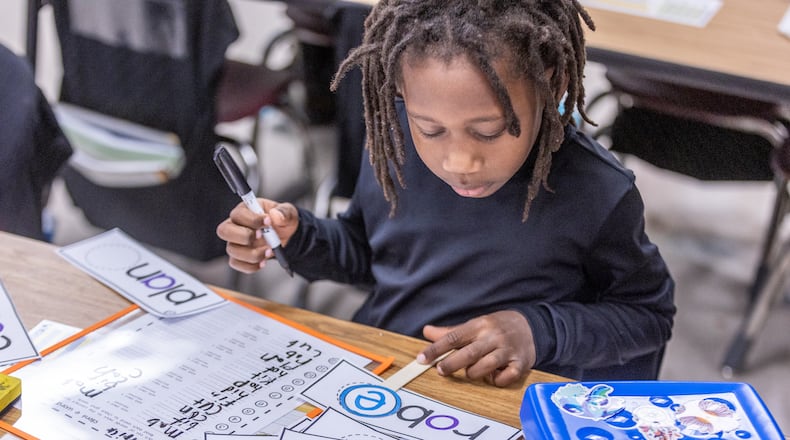In the vibrant city of Atlanta, where innovation and progress are the cornerstones of our community, Atlanta Public Schools has a pivotal opportunity to lead the way in transforming literacy education — an essential steppingstone to lifelong success.
Despite the efforts of dedicated educators and the administration, reading proficiency among APS students remains a pressing concern. According to recent assessments, only a fraction of our students meet or exceed the proficiency levels expected for their grade level. This isn’t just a statistic; it’s a stark reminder of the barriers to equity and opportunity that many of our students face.
The time is now to reimagine how we approach literacy in our schools. Our mission must be clear: ensure every child, regardless of background, masters this fundamental skill that sets the stage for all future learning.
Credit: Bita Honarvar
Credit: Bita Honarvar
Here’s how we can achieve a greater level of literacy among our students:
- Invest in Early Childhood Literacy: Research consistently shows that early intervention can significantly impact a child’s ability to read and comprehend. APS should enhance support for pre-K programs and early elementary grades, focusing on phonics-based instruction and reading fluency.
- Foster a Culture of Reading: Schools must become hubs of literary activity. We need libraries that captivate young minds, programs that bring local authors into classrooms, and initiatives that provide books to students with limited access at home.
- Support Educators with Specialized Training: Ensuring teachers have the tools and training to effectively teach reading is crucial. This includes ongoing professional development in the latest literacy education techniques and strategies.
- Engage the Community: Literacy is not solely a school issue; it takes a communitywide commitment. Partnerships with local businesses, nonprofits and universities can provide resources and support for literacy programs.
- Use Data to Drive Decisions: By monitoring student progress and program effectiveness, APS can adapt and refine teaching methods to best meet the needs of our diverse student body.
Our goal is to ensure that each APS student becomes a proficient reader by the third grade. The benefits of achieving this goal are profound, setting our children on a path to academic success and empowered citizenship. The Atlanta Board of Education acknowledges the critical role literacy plays in student success and is committed to addressing literacy disparities and promoting equity across all demographics within the APS.
This commitment extends especially to those groups who have historically been disenfranchised, including African American students, multilingual learners and children from low socioeconomic backgrounds, as well as those not meeting grade-level proficiency.
Recognizing the illiteracy crisis as a public health issue at epidemic levels, the board is dedicated to implementing a comprehensive literacy policy outlining strategic goals to overcome the literacy challenges faced by the district, which have historically led to inequitable outcomes. The policy objectives are:
- High-Quality Early Learning: Provide students with robust early learning experiences that lay the foundation for literacy success.
- Systematic Instruction: Adopt a “science of reading” approach, a body of evidence-based research that emphasizes explicit, systematic instruction in phonemic awareness, phonics, decoding, fluency, vocabulary and comprehension throughout all grade levels.
- Community Engagement: Strengthen community support and partnerships that enhance literacy learning outside traditional classroom settings.
- Continuous Assessment and Accountability: Integrate ongoing assessments, including universal reading screeners, to monitor student progress and ensure effective outcomes.
- Professional Development: Ensure educators are equipped with current, evidence-based literacy teaching practices through comprehensive professional development.
- Timely Interventions: Provide immediate, tiered support for students at risk of not meeting literacy benchmarks.
The board recently adopted a policy to address the importance and impact literacy has in the lives of our students. Literacy success requires a combination of high-quality early learning experiences; explicit and systematic instruction during elementary and secondary school; and strong family and community support utilizing school- and community-based partners.
Interim Superintendent Danielle Battle prioritized literacy as her No. 1 initiative. This work directly aligns with Georgia House Bill 538, requiring all kindergarten through third grade teachers to be trained in the science of reading.
As a district, we have chosen to do this work from kindergarten to fifth grade since many students are missing foundational skills. The “Readers are Leaders” literacy initiative is an 18-month professional learning requirement consisting of taking the Cox Campus Science of Reading modules independently by school leaders, teachers and district leaders, including the APS superintendent. Support during this work is vital. The board has provided funding to hire a Readers are Leaders coordinator and five specialists at the district level to support the Readers are Leaders instructional coaches provided for the district’s elementary schools along with resources to teach and assess structured literacy block components.
This overall literacy policy is a commitment not only to improve literacy but to transform the lives of all APS students, equipping them with the skills necessary for academic success and fulfilling futures.
Erika Mitchell is the chair of the Atlanta Board of Education.
About the Author
Keep Reading
The Latest
Featured


